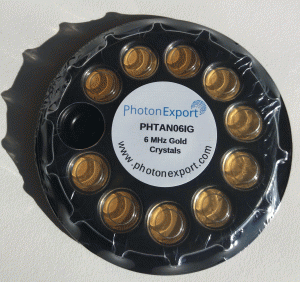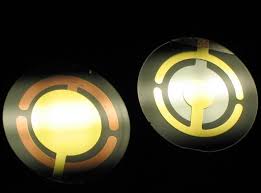Кварцевые кристаллические микровесы (ККМ) – это микроэлектронные устройства, используемые в вакуумных камерах напыления для измерения толщины тонкой пленки на подложках. Для этого используется частотная характеристика, которую дает кристалл кварца в процессе нанесения покрытия. Это изменение частоты может быть связано с количеством материала покрытия на поверхности кристалла.
Кристаллы кварца отображают толщину на уровне Ангстрема (1 Ангстрем эквивалентен 0,00000000393701 дюйма или 0,0000001 миллиметра). Их уровень точности и аккуратности очень важен, поскольку отклонения толщины всего в 10 Ангстрем могут сильно повлиять на характеристики изделия.
Влияние этого процесса на систему управления и ее ограничения является важным шагом для разработки инновационных и новых продуктов. Важность датчиков на кварцевых кристаллах возрастает в последние двадцать лет, поскольку более совершенные оптические, электрические и магнитные устройства требуют датчика, способного обрабатывать нужные измерения.
Некоторые из отраслей промышленности, которые используют этот процесс в своих производственных процессах: оптическая, полупроводниковая, производство солнечных элементов и тонкопленочных дисплеев (OLED).
Продлите срок службы кварцевого монитора, выбрав подходящий электрод.
- Кварцевые датчики с частотой 6 МГц, совместимые с монитором, контроллером и микровесами INFICON.
- Размер: 14 мм (0,550 дюйма).
- Частота: 6 МГц
- Также доступен кварцевый кристалл 5 МГц.
- Размер: 12,4 мм (0,489 дюйма).
- Частота: 5 МГц
Выбор электродной диаграммы

| Electrode Material | Application Type | Electrode Chart Selection | Main Property |
| Gold | Standart | Infinite | Most common, adapted for most applications |
| Silver | Sputtering Type | Depends on oxidation and exposure to sulfur content in air (tarnishing effect) | Highest thermal conductance. Adapted when better heat transfer to cooled sensor body is needed. |
| Alloy | High Stress Coatings, Optical films, high stress semiconductor materials | Shorter than gold, two times more than Silver, with time alloy oxidize | Higher activity values compared to Gold and Silver |
Проверьте кварцевое тонкопленочное мониторное оборудование здесь.
О кварцевых микровесах
Датчики QCM (кварцевые микровесы) измеряют изменение массы на единицу площади путем измерения изменений частоты резонатора кварцевого кристалла с использованием его пьезоэлектрических свойств. Частота изменяется линейно в зависимости от массы (или толщины). Системы мониторинга кристаллов кварца являются важным компонентом вакуумных камер для осаждения тонких пленок, обычно используемых в массовом производстве.
Очень важно контролировать температуру, поскольку резонансная частота также может сильно меняться в зависимости от температуры. Существуют различные типы кристаллов в зависимости от их устойчивости к температуре.
Обычно работают на уровне Ангстрема (порядка 10–10). Небольшие отклонения по толщине, например 10 или менее ангстрем, могут существенно повлиять на характеристики продукта. В последние годы измерения датчиков QCM все больше и больше совершенствуются. В настоящее время для современных оптических, электрических и магнитных устройств требуется технологический датчик, способный надежно измерять толщину слоев с разрешением 1 ангстрем.
Как выглядит типичная система контроля качества?
Внутри вакуумной камеры рядом с подложкой размещается датчик для измерения толщины пленки. Важно знать диапазон его рабочих частот и качество электрода этого кристалла. Вакуумная камера должна иметь терморегулируемый корпус с функцией регулирования температуры датчика и его механической целостности.
За пределами камеры электрический монитор создает ток, который заставляет кристалл вибрировать и отслеживает эту частоту с течением времени. Очень важно, чтобы этот монитор мог точно отслеживать изменения частоты кристалла и температурные характеристики. Внутренний микропроцессор может преобразовать эти изменения частоты во времени в фактическую толщину пленки.
Основные характеристики кристаллов кварца:
Кристалл может иметь различную форму электрода в зависимости от модели системы, которую вы приобретаете. Физические характеристики кристалла:
- Материал: Чистый монокристалл диоксида кремния.
- Размеры: 0,550 дюйма +. 000/0,002 дюйма наружный диаметр
- Контур: 2,5–3,0 диоптрии (радиус кривизны 212–177 мм), плоско-выпуклый.
- Обработка: 7 микрон среднеквадратичной шероховатости по плоской и контурной сторонам.
- Отсутствие сколов, царапин и следов травления в пределах прозрачного отверстия диаметром 13,95 мм.
Электрические характеристики кристалла:
- Доступные частоты: 5 и 6 МГц, основной последовательный резонанс.
- Сопротивление: <10–15 Ом
- Контактное сопротивление: <10 Ом от края до края на стороне рисунка.


